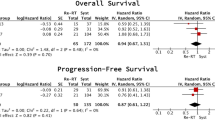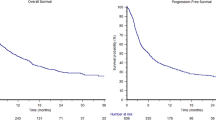Abstract
Purpose The aims of this trial were to assess the safety and efficacy of two different dosing schedules of irinotecan (CPT-11) in recurrent glioma patients, to assess irinotecan pharmacokinetics in patients on enzyme-inducing antiepileptic drugs (EIAEDs) and steroids, and to correlate with toxicity and response to treatment. Methods Sixty-four recurrent glioma patients were included in this study. Schedule A patients received irinotecan weekly (125 mg/m2/w) for four out of six weeks. Schedule B patients received irinotecan every three weeks at a dose of 300 mg/m2. A 20% dose reduction was implemented for patients who had received prior nitrosureas. Treatment was continued until unacceptable toxicity, tumor progression or patient withdrawal. Results There was no difference in confirmed responses between the two groups (6.3%). PFS at 6 months was 6.25% (2/32 patients) on schedule A and 18.75% (6/32 patients) on schedule B but median OS (5.1 versus 5.5 months), and survival at one year (19%) was similar for both arms. The most common grade 3–4 toxicities on schedules A/B were: thrombocytopenia (15.6%/21.9%), diarrhea (6.3%/12.5%) and nausea and vomiting (0%/15.7%). One toxic death due to infection in the absence of neutropenia occurred in schedule B. EIAEDs reduced SN-38 and CPT-11 area under the curve and increased CPT-11 cleareance. This effect was more prominent in schedule A patients. Steroids did not alter CPT-11 pharmacokinetics in either schedule. Conclusions Single agent irinotecan has modest activity in patients with recurrent gliomas, independently of the administration schedule. Irinotecan administration on an every 3 week schedule resulted in longer PFS-6, at the expense of more toxicity. EIAEDs alter CPT-11 pharmacokinetics in this group of patients, and should be taken into consideration when determining optimal dosing.
Similar content being viewed by others
References
Levin VA, Ictech S, Hess KR (2007) Impact of phase II trials with progression-free survival as end-points on survival-based phase III studies in patients with anaplastic gliomas. BMC Cancer 7:106. doi:10.1186/1471-2407-7-106
Osoba D, Brada M, Yung WK, Prados MD (2000) Health-related quality of life in patients with anaplastic astrocytoma during treatment with temozolomide. Eur J Cancer 36(14):1788–1795. doi:10.1016/S0959-8049(00)00165-9
Cloughesy TFPM, Mikkelsen T, Abbrey LE, Schiff D Yung WK et al (2008) A phase II, randomized, non-comparative clinical trial of the effect of bevacizumab (BV) alone or in combination with irinotecan (CPT) on 6-month progression free survival (PFS6) in recurrent, treatment-refractory glioblastoma (GBM). J Clin Oncol. 2008 ASCO Annual Meeting (Abstract 2010b)26(May 20 suppl):91s
Hsiang YH, Hertzberg R, Hecht S, Liu LF (1985) Camptothecin induces protein-linked DNA breaks via mammalian DNA topoisomerase I. J Biol Chem 260(27):14873–14878
Kawato Y, Aonuma M, Hirota Y, Kuga H, Sato K (1991) Intracellular roles of SN-38, a metabolite of the camptothecin derivative CPT-11, in the antitumor effect of CPT-11. Cancer Res 51(16):4187–4191
Friedman HS, Petros WP, Friedman AH et al (1999) Irinotecan therapy in adults with recurrent or progressive malignant glioma. J Clin Oncol 17(5):1516–1525
Chamberlain MC (2002) Salvage chemotherapy with CPT-11 for recurrent oligodendrogliomas. J Neurooncol 59(2):157–163. doi:10.1023/A:1019608404378
Cloughesy TF, Filka E, Nelson G et al (2002) Irinotecan treatment for recurrent malignant glioma using an every-3-week regimen. Am J Clin Oncol 25(2):204–208. doi:10.1097/00000421-200204000-00022
Cloughesy TF, Filka E, Kuhn J et al (2003) Two studies evaluating irinotecan treatment for recurrent malignant glioma using an every-3-week regimen. Cancer 97(9 Suppl):2381–2386. doi:10.1002/cncr.11306
Batchelor TT, Gilbert MR, Supko JG et al (2004) Phase 2 study of weekly irinotecan in adults with recurrent malignant glioma: final report of NABTT 97–11. Neuro-oncol 6(1):21–27. doi:10.1215/S1152851703000218
Prados MD, Yung WK, Jaeckle KA et al (2004) Phase 1 trial of irinotecan (CPT-11) in patients with recurrent malignant glioma: a North American Brain Tumor Consortium study. Neuro-oncol 6(1):44–54. doi:10.1215/S1152851703000292
Prados MD, Lamborn K, Yung WK et al (2006) A phase 2 trial of irinotecan (CPT-11) in patients with recurrent malignant glioma: a North American Brain Tumor Consortium study. Neuro-oncol 8(2):189–193. doi:10.1215/15228517-2005-010
Brandes AA, Tosoni A, Basso U et al (2004) Second-line chemotherapy with irinotecan plus carmustine in glioblastoma recurrent or progressive after first-line temozolomide chemotherapy: a phase II study of the Gruppo Italiano Cooperativo di Neuro-Oncologia (GICNO). J Clin Oncol 22(23):4779–8476. doi:10.1200/JCO.2004.06.181
Quinn JA, Reardon DA, Friedman AH et al (2004) Phase 1 trial of irinotecan plus BCNU in patients with progressive or recurrent malignant glioma. Neuro-oncol 6(2):145–153. doi:10.1215/S1152851703000498
Reardon DA, Quinn JA, Rich JN et al (2004) Phase 2 trial of BCNU plus irinotecan in adults with malignant glioma. Neuro-oncol 6(2):134–144. doi:10.1215/S1152851703000413
Reardon DA, Quinn JA, Rich JN et al (2005) Phase I trial of irinotecan plus temozolomide in adults with recurrent malignant glioma. Cancer 104(7):1478–1486. doi:10.1002/cncr.21316
Loghin ME, Prados MD, Wen P et al (2007) Phase I study of temozolomide and irinotecan for recurrent malignant gliomas in patients receiving enzyme-inducing antiepileptic drugs: a North American Brain Tumor Consortium study. Clin Cancer Res 13(23):7133–7138. doi:10.1158/1078-0432.CCR-07-0874
Feun LG, Marini A, Landy H et al (2007) Clinical trial of CPT-11 and VM-26/VP-16 for patients with recurrent malignant brain tumors. J Neurooncol 82(2):177–181. doi:10.1007/s11060-006-9261-7
Reardon DA, Quinn JA, Vredenburgh J et al (2005) Phase II trial of irinotecan plus celecoxib in adults with recurrent malignant glioma. Cancer 103(2):329–338. doi:10.1002/cncr.20776
Vredenburgh JJ, Desjardins A, Herndon JEII et al (2007) Phase II trial of bevacizumab and irinotecan in recurrent malignant glioma. Clin Cancer Res 13(4):1253–1259. doi:10.1158/1078-0432.CCR-06-2309
Vredenburgh JJ, Desjardins A, Herndon JEII et al (2007) Bevacizumab plus irinotecan in recurrent glioblastoma multiforme. J Clin Oncol 25(30):4722–4729. doi:10.1200/JCO.2007.12.2440
Cloughesy TFPM, Mikkelsen T, Abbrey LE et al (2008) A phase, randomized, non-comparative clinical trial of the effect of bevacizumab (BV) alone or in combination with irinotecan (CPT)on 6-month progression free survival (PFS6) in recurrent, treatment refractory glioblastoma (GBM). J Clin Oncol 26(20s):91s (Abstract 2010b)
Gilbert MR, Supko JG, Batchelor T et al (2003) Phase I clinical and pharmacokinetic study of irinotecan in adults with recurrent malignant glioma. Clin Cancer Res 9(8):2940–2949
Rothenberg ML, Cox JV, De Vore RF et al (1999) A multicenter, phase II trial of weekly irinotecan (CPT-11) in patients with previously treated colorectal carcinoma. Cancer 85(4):786–795. doi:10.1002/(SICI)1097-0142(19990215)85:4<786::AID-CNCR5>3.0.CO;2-9
Macdonald DR, Cascino TL, Schold SC Jr, Cairncross JG (1990) Response criteria for phase II studies of supratentorial malignant glioma. J Clin Oncol 8(7):1277–1280
Pitot HC, Knost JA, Mahoney MR et al (2000) A North Central Cancer Treatment Group Phase II trial of 9-aminocamptothecin in previously untreated patients with measurable metastatic colorectal carcinoma. Cancer 89(8):1699–1705. doi:10.1002/1097-0142(20001015)89:8<1699::AID-CNCR8>3.0.CO;2-T
Abigerges D, Chabot GG, Armand JP, Herait P, Gouyette A, Gandia D (1995) Phase I and pharmacologic studies of the camptothecin analog irinotecan administered every 3 weeks in cancer patients. J Clin Oncol 13(1):210–221
Hare CB, Elion GB, Houghton PJ et al (1997) Therapeutic efficacy of the topoisomerase I inhibitor 7-ethyl-10-(4-[1-piperidino]-1-piperidino)-carbonyloxy-camptothecin against pediatric and adult central nervous system tumor xenografts. Cancer Chemother Pharmacol 39(3):187–191. doi:10.1007/s002800050558
Nakatsu S, Kondo S, Kondo Y et al (1997) Induction of apoptosis in multi-drug resistant (MDR) human glioblastoma cells by SN-38, a metabolite of the camptothecin derivative CPT-11. Cancer Chemother Pharmacol 39(5):417–423. doi:10.1007/s002800050592
Friedman HS, Keir ST, Houghton PJ (2003) The emerging role of irinotecan (CPT-11) in the treatment of malignant glioma in brain tumors. Cancer 97(9 Suppl):2359–2362. doi:10.1002/cncr.11305
Anderson GD (1998) A mechanistic approach to antiepileptic drug interactions. Ann Pharmacother 32(5):554–563. doi:10.1345/aph.17332
Levy RH, Mather GG (1998) Metabolic enzymes and antiepileptic drug interactions. Adv Neurol 76:49–55
Taguchi T, Wakui A, Hasegawa K, et al (1990) Phase I clinical study of CPT-11. Research group of CPT-11. Gan To Kagaku Ryoho 17(1):115–120
Herben VM, Schellens JH, Swart M et al (1999) Phase I and pharmacokinetic study of irinotecan administered as a low-dose, continuous intravenous infusion over 14 days in patients with malignant solid tumors. J Clin Oncol 17(6):1897–1905
Stefanik DF, Fellows WK, Rizkalla LR et al (2001) Monoclonal antibodies to vascular endothelial growth factor (VEGF) and the VEGF receptor, FLT-1, inhibit the growth of C6 glioma in a mouse xenograft. J Neurooncol 55(2):91–100. doi:10.1023/A:1013329832067
Acknowledgements
This study was supported by NCI grant CA25224 and Pharmacia & Upjohn. The authors would like to thank Paul Novotny and Stephen Cha from the Mayo Clinic Department of Biostatistics for their help with data analysis and Dr. Larry Schaaf from Ohio State for his help with sample analysis. They would also like to thank Mrs. Raquel Ostby for her help with manuscript preparation. This study was conducted as a collaborative trial of the North Central Cancer Treatment Group and Mayo Clinic and was supported in part by Public Health Service grants CA-25224, CA-35269, CA-52352, CA-35195, CA-35101, CA-37417, CA-35415, CA-35448, CA-35103, CA-63849, CA-63848.
Author information
Authors and Affiliations
Corresponding author
Additional information
Additional participating institutions include: Missouri Valley Cancer Consortium, Omaha, NE 68131 (Gamini S. Soori, M.D.); Carle Cancer Center CCOP, Urbana, IL 61801 (Kendrith M. Rowland, Jr., M.D.); Medcenter One Health Systems, Bismarck, ND 58506 (Edward J. Wos, D.O. & John T. Reynolds, M.D.); Iowa Oncology Research Association CCOP, Des Moines, IA 50309–1014 (Roscoe F. Morton, M.D.); Meritcare Hospital CCOP, Fargo, ND 58122 (Preston D. Steen, M.D.); Toledo Community Hospital Oncology Program CCOP, Toledo, OH 43623 (Paul L. Schaefer, M.D.); Geisinger Clinic & Medical Center CCOP, Danville, PA 17822 (Albert M. Bernath, Jr., M.D.); Michigan Cancer Research Consortium, Ann Arbor, MI 48106 (Philip J. Stella, M.D.); Altru Health Systems, Grand Forks, ND 58201 (Todor Dentchev, M.D.), Siouxland Hematology-Oncology Associates, Sioux City, IA 51105 (Donald B. Wender, M.D.); Sioux Community Cancer Consortium, Sioux Falls, SD 57105 (Loren K. Tschetter, M.D.); CentraCare Clinic, St. Cloud, MN 56301 (Harold E. Windschitl, M.D.).
Rights and permissions
About this article
Cite this article
Santisteban, M., Buckner, J.C., Reid, J.M. et al. Phase II trial of two different irinotecan schedules with pharmacokinetic analysis in patients with recurrent glioma: North Central Cancer Treatment Group results. J Neurooncol 92, 165–175 (2009). https://doi.org/10.1007/s11060-008-9749-4
Received:
Accepted:
Published:
Issue Date:
DOI: https://doi.org/10.1007/s11060-008-9749-4




